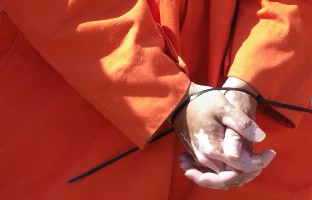Assembly-line justice

Five days a week, 70 people in shackles and orange jumpsuits are escorted into a federal courtroom in Tucson, Arizona. It's a foregone conclusion that all 70 will leave the courthouse as convicted criminals. By evening, many of them will be in Mexico. Some will be in U.S. prisons.
They are part of Operation Streamline, an attempt to simultaneously render harsher punishments for people who cross the U.S. border illegally and deal with the huge backlog of migration-related cases. Border patrol agents guard all of the courtroom's entrances and exits. Five or six defense lawyers are present; they have met with the prisoners earlier in the morning and advised them to forgo their right to trial. One prosecutor is there.
The prisoners are mostly young men in their 20s and 30s, nearly all of them from Mexico and Central America. They are, for the most part, laborers with no command of the English language and little formal education.
The men approach the judge in groups of eight, and their cases are handled in a rote fashion--all 70 are “processed” in 45 minutes to an hour. Those for whom their presence in the United States is a “first offense” are returned to the custody of Immigration and Customs Enforcement (ICE) where, presumably they are deported to their originating countries. All others are “convicted” and sent to prison for two years before they are also turned over to ICE.
Since it began in 2005, Operation Streamline has turned deportation cases previously handled exclusively by ICE into federal criminal cases that introduce thousands of people to our prisons every year. The ACLU has raised concerns about the program's criminalization of impoverished people whose crime is crossing a border and seeking work. The group has called for the suspension of Operation Streamline until its costs, both financial and human, can be better calculated and understood. The chief federal judge of Arizona has asked that her caseload be called a “judicial emergency” so that she can bring in more resources. The 9th District Court agreed.
The program's defenders say that it sends a strong message to people who cross the U.S. border illegally, and that it therefore is helpful to them--as well as to the border patrol agents who regularly arrest people in Arizona’s treacherous deserts. Other observers find both the spectacle of justice and the pain of individuals troubling. An organization called “Operation Streamline Watch” argues that if federal policy met its stated goal of “zero tolerance” for people who cross the border illegally, the caseload in the Tucson federal courthouse would go from the roughly 200 a day to more than 1,000.
If this happened, prisoners would need to be “processed” in groups of 40 instead of eight. We need to address the fundamental puzzle and colossal mess that is U.S. immigration policy. In the meantime, this ongoing assembly-line justice does little good.





